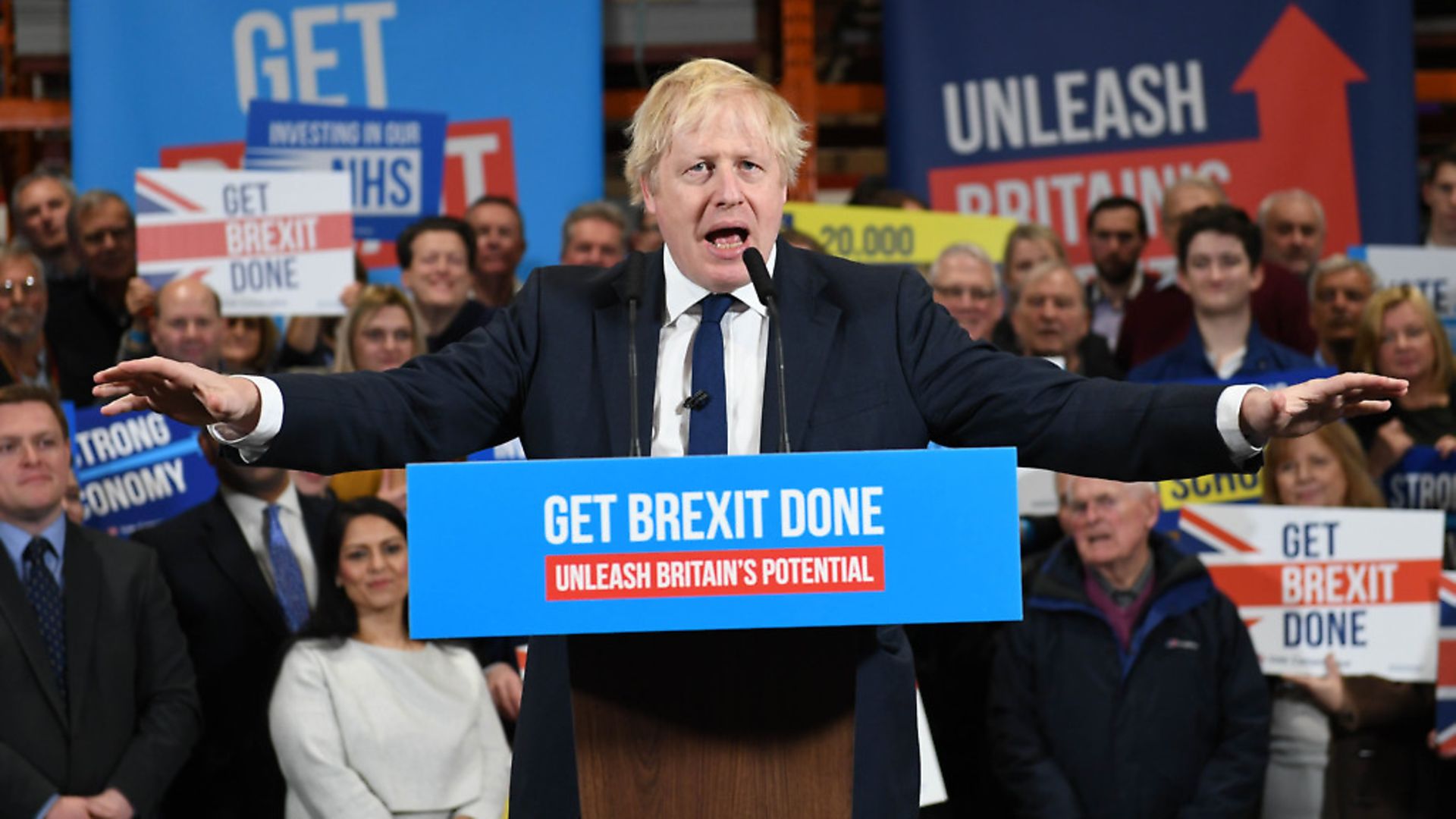
If Boris Johnson gets a majority, Brexit will only be the start of Britain’s problems. But he can still be stopped, says IAN DUNT.
Sometimes fear can be a great inspiration. You could feel it at what seemed to be a big moment in the campaign, when YouGov last week revealed its ‘multilevel regression and post-stratification’ (MRP) poll.
It was as close to an exit poll as we were going to get before the day of the election. In 2017, the same methodology provided the most accurate assessment of the result.
And it was bleak.
That was the fear right there. A shiver of it right down the back of your spine. A cold hard lump of despair being slowly digested and settling down in your stomach.
It projected a 68-seat majority for Boris Johnson: The Tories gaining another 42 seats, Labour losing 51 and seeing its red wall of midlands and northern towns crumble. It showed Lib Dem attacks on the Tories in southern England and SNP attacks in Scotland largely failing. Disaster.
It’s hard to describe the magnitude of the calamity such a result would entail. First and foremost, it means Brexit happens. Three years of resistance by Remainers falls away, all for nothing, and with it our commitment to Britain as an open, tolerant country, one committed to moderation and international cooperation.
Nothing could stop it. Johnson would pull the UK out by the end of January.
We’ll be in for years more bruising punishment during trade talks, the same old culture war in a technocratic straightjacket, but this time with no Remain escape chute.
Investment in Britain will stay subdued, restrained by the rolling uncertainty created by the repeated artificial one-year deadlines of negotiation.
Britain will spend another few years dedicating all of its resources to impoverishing itself and undermining its own role on the world stage.
Those in northern towns who were hit by austerity will become poorer still. The underlying conditions which originally drove Britain towards the nativist embrace will continue to deteriorate.
We don’t know what the Tory policies will be outside of Brexit. Their manifesto barely bothers to mention any other policy areas. But you can disentangle the approach from the allusions it makes.
The document mentions plans to “update” the Human Rights Act to ensure a “proper balance between the rights of individuals, our vital national security and effective government”.
We know what this means. They’ve tried it once before. Dominic Raab and Michael Gove attempted unsuccessfully to sabotage the Act when the Conservatives last won a majority in 2015.
They hate it for reasons which are comparable to Brexit. It offers the protections of the European Convention of Human Rights, injected directly into British law. These are vital safeguards protecting citizens from government interference. They’re used in countless cases every year by the weakest and most marginalised in society.
The reason they work so well is because they do not rely on the state to protect you against itself. Instead their ultimate authority lies outside national boundaries, via the Council of Europe. For those who treat all international institutions with suspicion, the Human Rights Act is the next logical target.
Getting rid of this international legal protection is a painful, complicated business, with knock-on effects for the Good Friday Agreement. In 2015, that proved too much for the Tories. But this time, with the scent of Brexit-tinged blood in the air, they’re more likely to go for it.
The same goes for judicial review. This is a mechanism which allows courts to rule on the legality of the actions of a public body. Ministers hate it, because it means that ordinary British citizens can challenge their decisions. Chris Grayling tried to destroy it after the 2015 election only to be undermined by his own endless capacity for inadequacy.
Now they plan to try again. “We will ensure that judicial review is available to protect the rights of the individuals against an overbearing state,” the manifesto says, “while ensuring that it is not abused to conduct politics by another means or to create needless delays.” This time, with a big majority, and a mission to undermine any form of scrutiny of the executive whatsoever, they are likely to succeed.
These legal attacks will come alongside the now standard culture war attack on independent scrutiny.
Since he has been in power, Johnson has defined himself by attacks on the courts and parliament. It’s at the heat of his election message. With enough seats, he can rid himself of parliamentary restraint altogether.
The assault will extend to the media. Earlier in the campaign, Gove responded to questions about the veracity of his leader’s comments by suggesting a Channel 4 journalist was a left-wing campaigner working with the Labour party.
Last week, the party complained to Ofcom about the channel and made threats, worthy of a tinpot dictatorship, about its licence. The Conservatives have removed the Daily Mirror from their election battlebus because of its critical coverage.
We’re not just fighting an election on the issue of policy. We’re fighting it on what kind of a country this is and how it is governed.
Is it based on reason, the separation of powers and a free press challenging the executive – the cornerstone principles of liberal democracy? Or is it based on an over-mighty government undermining the institutions which provide scrutiny and restraint?
If Johnson wins a majority, it will be considered a mandate for the latter. And more than that. It will be a vindication of his entire style of leadership: Of ceaseless lies, division and basic moral irresponsibility. Aspiring political leaders will be watching and they will decide that these tactics work. Then they will emulate them. It will degrade the standards of our political culture for years after the prime minister has left the scene.
But it can be stopped, even now. Our problem is not that we lack the numbers. More people in this country oppose Johnson than support him.
More oppose Brexit than back it. Our problem is that we lack the commitment.
That failure of commitment started with the party leaders – Jeremy Corbyn, Jo Swinson and others – who needed to coordinate a response to prevent a splintering of the Remain vote.
But once they failed to do so, the failure took hold of voters themselves. Too many are sticking with their favoured party instead of the one best placed to defeat Johnson, allowing him to cruise through the middle.
For a movement based on international unity, Remain is proving embarrassingly incapable of delivering unity on a domestic level.
In countless seats where the Liberal Democrats are going up against the Conservatives, Labour support would get them over the line, even where it is very low. In countless seats where Labour are going up against the Conservatives, Lib Dem and Green support would stop a Tory victory.
This goes for Remain-voting seats like Winchester, where the Lib Dems are just trailing the Tories. If less than half of Labour voters in the seat switched to the Lib Dems, they could stop the Conservatives. But it also goes for Leave-voting seats like Bedford, which the Tories look set to win. If just 7% of Lib Dem or Green voters switched to Labour, they could prevent a Tory gain.
There are a handful of seats, like Kensington, where Labour and the Lib Dems are really split right down the middle and it is impossible to work out the most likely Tory challenger. But in most, the answer is becoming increasingly clear. We either vote on the basis of that unavoidable fact or we lose.
That’s what this election comes down to: A combination of cold-hearted strategy and full-blooded passion. That’s how the commitment is expressed.
At the moment, we have the numbers but lack the commitment. Unless we find it soon, we are about to go through a very brutal few years. If that’s not worth fighting against – no matter what it takes, no matter who you have to vote for – then it’s not clear what is.










